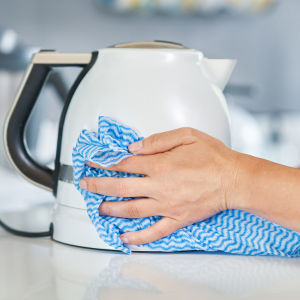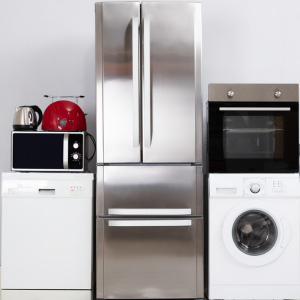Your kitchen is the heart of your home and the hub of culinary activity. High-quality kitchen equipment is crucial for efficiently preparing meals and keeping the process enjoyable. Given its importance, it's essential to maintain the kitchen equipment to ensure it serves you well for years to come, whether you are managing a restaurant or just looking to save on replacement costs. In this blog, we will provide maintenance tips and best practices for preserving the longevity of your restaurant supplies and equipment, maximizing its potential, and will discuss when it's time to replace them.
How Long Do Various Kitchen Appliances Last?
As durable as they might seem, all kitchen appliances have a limited lifespan. Here's a general breakdown of how long each type typically lasts:
- Refrigerators: 10-15 years
- Ovens and stovetops: 10-15 years
- Stand mixers: 10-12 years
- Chest freezers: 10-11 years
- Dishwashers: 8-10 years
- Microwaves: 5-10 years
- Coffee Machines: 5-10 years
- Toasters: 6-8 years
- Juicers: 5-7 years
- Rice cookers: 3-8 years
- Electric kettles: 4-5 years
- Blenders: 3-5 years
- Air fryers: 2-3 years
These lifespans depend on factors like quality, usage, and maintenance. With proper care, your kitchen equipment may even last longer than these estimates.
Top Tips To Care For All Your Kitchen Equipment

In this section, we'll explore essential tips to help prolong the life of your kitchen equipment. From regular cleaning and inspection to appropriate handling and storage, the importance of efficient appliances, and the value of warranties. We'll also discuss the benefit of replacing and upgrading components when necessary. These tips aim to enhance the functionality and efficiency of your kitchen tools, ensuring they remain in prime condition for extended periods.
Clean Appliances After Each Use
Not allowing food and residue to accumulate on your appliances will prevent damage and maintain their efficiency. Be sure to follow the manufacturer's guidelines for cleaning, which typically include wiping down the surfaces and using appropriate cleaning products.
Maintain Blades On Your Knives
Sharpening your kitchen knives regularly will keep them in optimal condition. Doing so extends the life of these essential tools and makes them safer and more efficient to use.
Check For Wear And Tear
Take time to inspect your kitchen equipment for signs of wear and tear. This includes looking for loose parts, dents, scratches, or other potential issues. Addressing these promptly can save you money in the long term and extend the life of your equipment.
Store Appliances And Tools Appropriately
To extend the lifespan of your kitchen equipment, be sure to store them according to the manufacturer's recommendations. Not only will this protect your appliances from damage, but it will also help you keep your kitchen organized and easily accessible.
Handle Equipment With Care
Being gentle and caring when handling your kitchen equipment can significantly affect its lifespan. Avoid dropping or dragging appliances, as this can cause unnecessary wear and tear or even break them.
Choose Energy-Efficient Appliances
To minimize the impact of your kitchen on the environment and your utility bills, opt for energy-efficient appliances. These appliances will operate more efficiently, which will not only save you money but also help extend the life of your equipment.
Consider Buying Appliances With Warranty And Support
Investing in kitchen equipment with a good warranty and customer support can provide peace of mind and save you from potential issues. Companies offering warranties and support typically produce higher-quality products that last longer.
Replace Worn-Out Parts
Instead of immediately replacing your entire appliance when it shows signs of wear, try replacing worn-out parts. This can often prolong the life of your kitchen equipment and save you money in the long run.
Upgrade Components When Necessary
Sometimes, upgrading specific components of your kitchen equipment can improve its performance and prolong its life. For example, you can replace the motor on an aging blender or upgrade the thermostat on your oven for better temperature control.
Effective Preservation Techniques For Common Kitchen Appliances

Electric appliances constitute a major part of everyone's kitchen equipment. In this section, we'll go over various methods to extend the lifespan of your kitchen appliances so you don't have to spend more on replacements than necessary.
Refrigerators
To maintain a long-lasting refrigerator, try doing the following:
- Check seals regularly and replace them if damaged.
- Clean the condenser coils at least twice a year.
- Keep the thermostat at the recommended temperature (37°F/3°C in the fridge, 0°F/-18°C in the freezer).
- Defrost when necessary to prevent excessive ice buildup.
- Make sure the top of the refrigerator is clear of any storage items.
Dishwashers
Ensure that your dishwasher runs smoothly by:
- Running the rinse cycle to clean the interior.
- Inspecting the dishwasher's spray arms and unclogging any blocked holes.
- Regularly cleaning out the dishwasher filter.
- Ensuring proper loading of dishes and not overloading the dishwasher.
- Using the right dish soap for the dishwasher.
- Not combining vinegar and bleach while cleaning.
Ovens And Stovetops
Maximize the efficiency and longevity of ovens and stovetops by:
- Frequently wiping down and cleaning the stovetop after use.
- Regularly checking and replacing any burnt or damaged electrical components.
- Keeping the oven door seal clean and intact.
- Make sure the stove hood is functioning correctly.
- Not using the oven’s self-clean feature.
Microwaves
Extend the life of your microwave through these practices:
- Clean the microwave's interior and exterior regularly, removing any grease or food particles.
- Never operate the microwave without food inside, as it can cause the magnetron to burn out prematurely.
- Keep the microwave door's seal clean and in good condition to prevent leakage.
Small Appliances
Lastly, protect your smaller appliances like coffee makers, blenders, and slow cookers with these tips:
- Follow manufacturer guidelines for cleaning and maintenance.
- Avoid overloading with ingredients.
- Store small appliances in a cool, dry place when not in use.
Know When To Replace Your Kitchen Appliances
Determining when to replace your appliances is crucial to ensure optimal functionality and safety in your kitchen. Signs that it might be time to replace your equipment include:
- Frequent Malfunctions And Expensive Repairs: If you're frequently encountering issues with your appliance and the repair costs are mounting up, it may be more cost-effective to replace it in the long run.
- Declining Performance Or Unusual Noises: When appliances start to lose their efficiency or begin making abnormal sounds, it's often a sign that they're nearing the end of their lifespan. Check these signs against the manufacturer's operational guidelines, and if the problem persists, consider a replacement.
- Increased Energy Consumption: If you notice a spike in your energy bills linked to a specific appliance's use, it might indicate that the appliance is no longer performing at its best. Energy-efficient appliances are more economical and environmentally friendly.
- Rust Or Visible Damages: Rust, physical dents, broken parts, or other visible signs of wear and tear can impact the appliance's operation and can even pose safety hazards. If repairing these issues does not solve the problem or if it's impractical, replacing the appliance is the wisest choice.
It's vital to evaluate the repair cost against the price of a new appliance. Sometimes, opting for a newer model is less expensive and safer in the long term and can offer improved features and functionality.
Maximize The Life Of Your Kitchen Equipment For Years To Come!
By following the pointers discussed above, you can effectively extend the lifespan of your kitchen equipment and save money on replacements. Remember, proper care, regular maintenance, and investing in high-quality appliances are all essential factors in keeping your kitchen running efficiently for years to come.
Why not start implementing these tips today? Begin by inspecting your kitchen equipment and making any necessary upgrades or replacements. Your future self (and wallet) will thank you!









